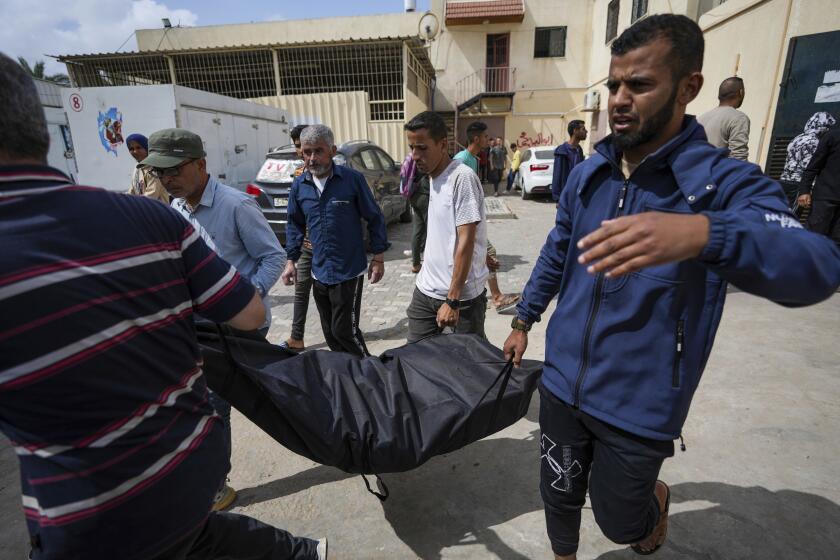Questions on N. Korea data
A senior Republican congressman assailed the Bush administration Sunday for the timing and nature of its charges that North Korea helped Syria build a secret nuclear weapons facility.
Administration officials went before the Senate and House intelligence panels last week carrying satellite imagery and photos that they said linked North Korea with the desert structure that Israel destroyed in an airstrike last year.
“The administration has handled this very badly” and “has a credibility problem,” Rep. Peter Hoekstra of Michigan, the ranking Republican on the House Intelligence Committee, said on CNN’s “Late Edition.”
The allegations come as negotiations continue between the United States and other countries and North Korea over the dismantling of the Pyongyang government’s nuclear program.
In exchange for North Korea abandoning its nuclear weapons program, the Bush administration has offered to ease sanctions on the isolated country and remove it from a list of states that sponsor terrorism -- steps that conservative lawmakers see as unacceptable concessions.
Hoekstra said he believed that the administration’s revelations were an attempt to gain leverage in the talks, but that the strategy might backfire with Congress, particularly among those conservatives.
“I think the administration believes it will help them get to a deal with North Korea,” he said.
“The timing of it, what information they released, what information they did not release and who they released it to, is going to make it more difficult for them to reach an agreement that will be supported by Congress and supported by the American people,” Hoekstra said.
Both Hoekstra and Democratic Sen. Dianne Feinstein of California, a member of the Senate Select Committee on Intelligence, said on the CNN program that based on the administration’s presentation, they had little doubt the Syrian facility was related to nuclear production.
Some photos appeared to show rods that control heat in a nuclear reactor and buildings that bear strong structural and engineering similarities to North Korea’s Yongbyon nuclear reactor.
“This is compelling information,” Hoekstra said.
In remarks published Sunday, Syrian President Bashar Assad dismissed the allegations that the site known as Al Kibar was involved in nuclear activities.
“Is it logical?” Assad told a Qatari newspaper, insisting that Al Kibar had been a nonnuclear military site. Assad reportedly gave the interview before the administration’s April 24 presentation to Congress and was responding to media reports that the site may have housed a reactor.
“A nuclear site did not have protection with surface-to-air missiles? A nuclear site within the footprint of satellites in the middle of Syria in an open area in the desert?” Assad said.
Feinstein said the administration’s information raised questions about North Korea’s potential proliferation activities in other parts of the world.
She suggested that North Korea may have been the target of the administration’s information campaign, and that the administration may also have been “one way or another influencing an agreement with Syria and Israel.”
Hoekstra and Feinstein also criticized the White House for not sharing more information with Congress in general and the intelligence committees in particular, a recurring complaint against the Bush administration.
Despite lawmakers’ repeated requests for briefings, the administration has said almost nothing about the Israeli airstrike, which took place Sept. 6, 2007.
Feinstein said she learned of the North Korean link for the first time when the administration sent CIA Director Michael V. Hayden, Director of National Intelligence J. Michael McConnell and White House national security advisor Stephen Hadley to brief Congress last week.
Lawmakers are wary because the Bush White House has been tightfisted with information, Feinstein said. When the administration does share intelligence, such as the Syrian satellite imagery and photos, she said, “it makes us very suspicious as to why are they doing it right now.”
Alluding to the administration’s incorrect prewar claims that Iraq had weapons of mass destruction, Hoekstra said the White House needs to build trust.
“The administration has a credibility problem. And if they’re going to deal with this credibility problem, the way to deal with it is to be more open, especially with members of Congress,” he said.
--
More to Read
Start your day right
Sign up for Essential California for news, features and recommendations from the L.A. Times and beyond in your inbox six days a week.
You may occasionally receive promotional content from the Los Angeles Times.






